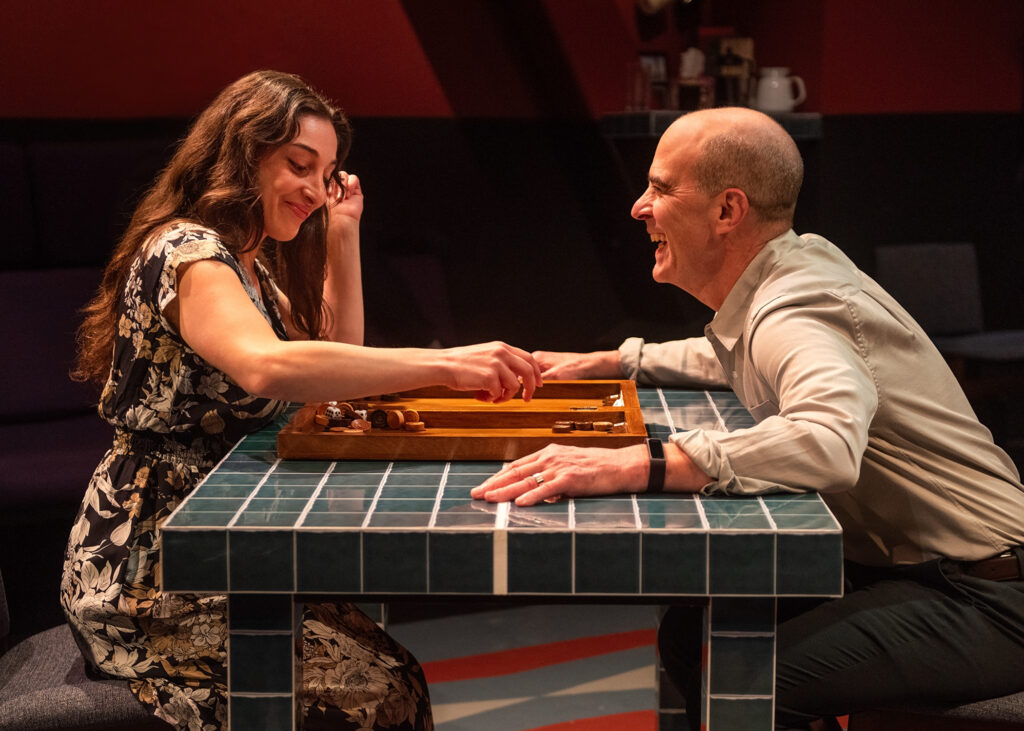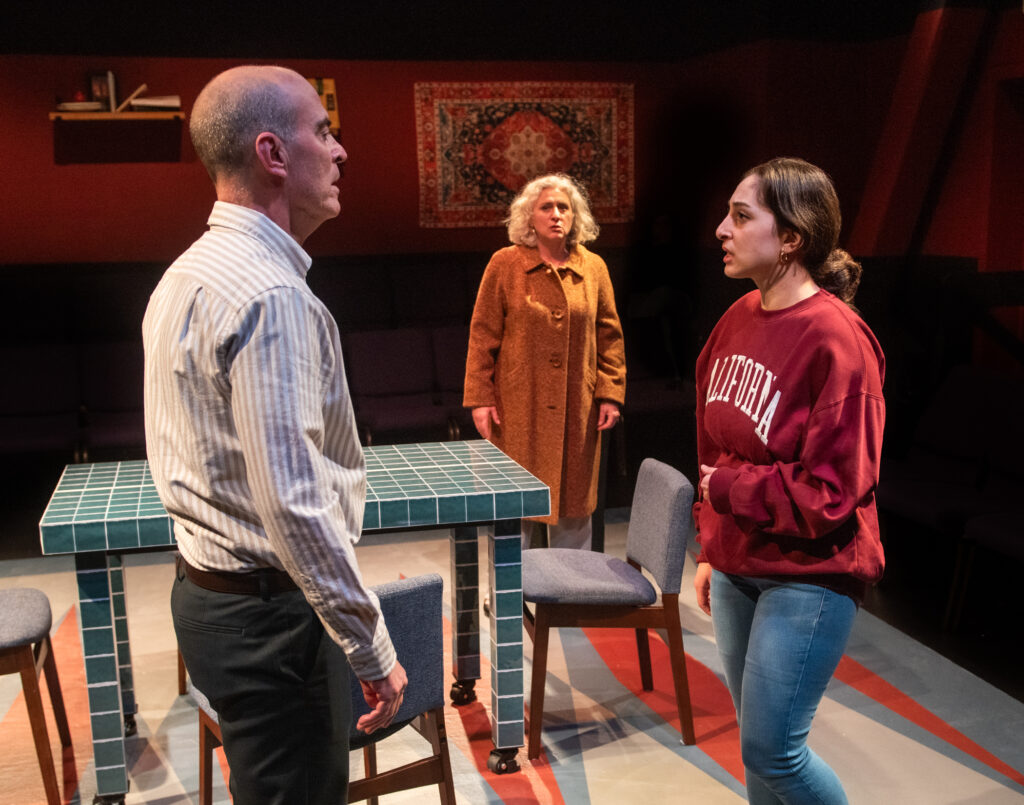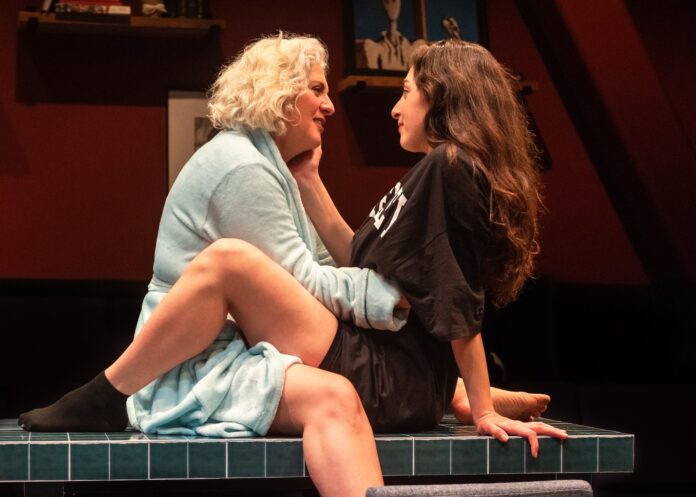Timing will always be funny. When NCTC collaborated with Golden Thread for this world premiere commission by Torange Yeghiazarian, Iran’s “Women. Life. Freedom.” Movement was considered a small blip in the minds of most Westerners. Now, Iran is in the news on a daily basis due to its entanglement in a Middle Eastern event—Israel’s attempted genocide of Palestinians—that has inspired Golden Thread’s entire season.
Yeghiazarian’s play The Tutor (world premiere through May 12 at the New Conservatory Theater Center, SF), is an intimate character piece about queer love, cultural hypocrisies, and the awkwardness of the generation gap. No doubt, a heavy order for any would-be dramatist, but Yeghiazarian pulls it off quite well.
Middle-aged Iranian Kayvon (Lawrence Radecker) lives in the Bay Area with his elderly mother and a new bride via arranged marriage in her mid-20s, Baran (Maya Nazzal). Naturally, Kayvon’s match with such a younger spouse stirs the ire of his oldest friend, the outspoken UC Berkeley professor Azar (Debórah Eliezer). She also isn’t thrilled that Kayvon would ask Azar to coach Baran on the ways to, for lack of a better description, be American.
After reluctantly agreeing to be Baran’s cultural tutor, it isn’t long before the two’s interest in one another becomes more than simply cordial. Needless to say, that’ll have consequences for Baran’s marriage (as her green card has yet to arrive), Azar’s career, and Kayvon’s ideas of both family and “being a man.”

So, let’s get one thing out of the way first: It’s no secret that Baran is a lesbian. The script is, refreshingly, not a well-worn story about queer awakening and the tragedy that comes from it (a story that, inexplicably, is still told today).
No, this is a story about people fairly secure in who they are, but having clashing with personal truths of others. Baran, we learn, is from a wealthy Iranian family who were able to cover up her queerness as she frequently went clubbing and had romances. It wasn’t until the number of murders of her friends and lovers began to add up that she accepted an arranged marriage with the much-older Kayvon. After six months, the two haven’t had sex, which Kayvon attributes to virginal hesitance.
I don’t recall Azar explicitly identified as bi, but her hetero relationships definitely monopolize her past sex life. A mathematician, she’s someone who thinks analytically, only allowing herself the rare indulgence of a romance with this horny young millennial. And make no mistake: Baran has a healthy libido that’s played as much for drama as it is for humor. She has the young person’s shortcoming of only seeing the here-and-now, leading to the tragedy that becomes the catalyst for the plot proper. Sure, Kayvon’s Ned Flanders-like attitude and ideas of gender are harmful—especially as the play goes on—but everyone is being dishonest. It takes all three to tango.
Also working in the play’s favor is its equal parts affection for and skewing of the Bay Area. It’s clearly written with a genuine love of the region and city in which it premieres, but there’s a disdain for the hypocrisy of affluent white (supposed) leftists who love to virtue signal rather than actually enact change. Azar and her colleagues believe that Baran telling her story will benefit Iranian women on both sides of the Atlantic, but this proves to be the rare instance where Azar hasn’t thought ahead and considered the public consequences for Baran’s family. And, lest one forget the humor abundant in the script, one of the best jokes is when Baran comes out to Kayvon, only for him to counter that she’s a young and impressionable fool taken in by the Bay Area.
Help us save local journalism!
Every tax-deductible donation helps us grow to cover the issues that mean the most to our community. Become a 48 Hills Hero and support the only daily progressive news source in the Bay Area.

It’s one of the great humanizing elements that make the play captivating. While they occasionally fall into talking points, none of the trio is an avatar for any political ideology. Director Sahar Assaf (Golden Thread’s AD) certainly delights in letting her cast explore those moments with an emphasis on nuance and idiosyncrasy, even when someone is yelling. Scenes with all three are, for the most part, a compelling Freudian dance where the identifiers of “Id”, “Ego”, and “Super-Ego” tend to switch mid-sentence.
Although Eliezer and Nazzal carry most of the weight (with Nazzal delivering one of the year’s best performances thus far), Radecker frequently seems lost. Whether the result of his being directed that way or perhaps never quite grasping the heart of the character, he’s vastly outmatched by both of his co-stars as they all trek around Matt Owens’ detailed set (for which the floor resembles a backgammon board, Kayvon’s favorite game).
I also appreciated how this is one of the few plays I’ve seen to actually integrate the lasting effects of COVID into the story. We learn early that Kayvon’s unseen elderly mother’s health took a turn for the worse after a COVID infection the year prior. Granted, none of the trio ever mask up, and they seem to hold gatherings where no one does either, but this baby step of actually having a story where the not-over pandemic is treated (semi-)realistically certainly caught my attention.
Incidentally, rather than wait for the show’s stronger COVID safety measures on their Enhanced Safety Night, I attended opening night where I was maybe one-of-four masked patrons. The more intimate Walker Theatre may have similar HVAC to the larger Decker Theatre, since my Aranet4’s CO² readings peaked around 1022ppm over the course of the two-act show.
The Tutor is a wonderfully fresh take on love triangles, sexual identity, societal conventions, and yes, Western portrayals of people of Middle Easter descent. Add in the natural integration of the post-COVID-infection subplot (it’s not that hard, writers!) and this story about silenced voices comes in wonderfully clear.
THE TUTOR’s world premiere runs through May 12 at the New Conservatory Theatre Center, SF. Tickets and further info here.





